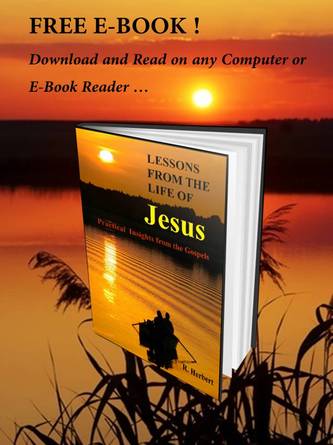
 The historical setting for the New Testament Book of James is extremely important, as it can help us understand a great deal of what the apostle wrote. Our new article: "The Epistle of James: Faith in Difficult Times" gives a little bit of the background that can open up your understanding of much that is written in this important epistle. You can read it here.
 Scriptures in Question: “For God so loved the world that he gave his one and only Son, that whoever believes in him shall not perish but have eternal life” (John 3:16). “Do not love the world or anything in the world. If anyone loves the world, love for the Father is not in them” (1 John 2:15). The first clue we have that there is no contradiction between these seemingly opposing verses is that they were both written by the same person – the apostle John. This alone indicates that it would be unlikely that the two statements were at variance. The word “world” (Greek kosmos) found in both these verses is one John uses frequently – an amazing 79 times in his Gospel and a further 25 times in his epistles – more often than any other biblical writer. But the word does not always have exactly the same meaning in each case. Just as we can use the word “world” in English to mean the planet Earth, the world around us, everything in the world, or just the people of the world, so the Greek word could be used with many of these same meanings. We can see this range of meaning in some of the verses where John uses kosmos in his first epistle: The planet Earth: “In this was manifested the love of God toward us, because that God sent his only begotten Son into the world” (1 John 4 : 9). The people of the world: “Marvel not, my brethren, if the world hate you” (1 John 3 : 13). The world around us: “Beloved, believe not every spirit, but try the spirits whether they are of God: because many false prophets are gone out into the world” (1 John 4:1). The way of the world: “For whatsoever is born of God overcomes the world” (1 John 5 : 4). When John tells us in his Gospel that God loved the world, he is clearly referring to the people of the world (as God did not give his Son for the sins of the planet or the things in the world). John uses “world” in exactly the same way in his epistle when he writes “And he is the propitiation for our sins: and not for ours only, but also for the whole world” (1 John 2:2). On the other hand, when John tells us in his epistle that we must not love the world, it is equally clear, when we read the verse in context, that he is talking about the system or way of the world. We need only look at the following verse to see this: “For all that is in the world, the lust of the flesh, and the lust of the eyes, and the pride of life, is not of the Father, but is of the world” (1 John 2:16). So, we must carefully distinguish between the various meanings of kosmos when John uses the word “world,” though this is not usually difficult. His context usually makes it clear which meaning he has in mind. In the seemingly contradictory examples we looked at, John is talking about two very different things – humanity and the way of life of humanity. For John, the “world” in the latter sense is synonymous with darkness and evil (John 3:19), just as he tells us God is synonymous with goodness and light. John’s point is that we must choose to love either darkness or light, the way of the world or the way of God.  LESSONS FROM THE LIFE OF JESUS: PRACTICAL INSIGHT FROM THE GOSPELS By R. Herbert Rather than simply retelling the story of the life of Jesus, our latest e-book focuses on some of the details of the Gospel narratives that are easy to miss, but which can help us to better understand his life and teachings. In each case there are lessons we can learn and apply – sometimes with the potential for an effect on our lives that is well out of proportion to the seemingly small detail that conveys the lesson. Enrich your understanding of the life and work of Jesus and take away lessons you can apply today. You can download a copy in three formats – PDF, epub, and mobi (Kindle) – to read on your computer or e-book reader. No registration or email address is needed - simply click and download from our e-books page here.  The story of Jesus’ temptation in the wilderness is one of the most striking and memorable accounts in the New Testament (Matthew 4:1-11, Mark 1:12-13, Luke 4:1-13). Temptations to turn stones into bread, to leap from high pinnacles, and to worship at the feet of evil make for a seemingly larger than life plot – a heroic battle fought out against a canvas of cosmic significance. But it is easy to miss the significance of the wilderness temptations Christ underwent at the beginning of his ministry – and their significance in our lives, too. Our new article, "His Struggles and Ours," puts the wilderness temptations of Christ in context and shows how we can learn vital lessons from them. You can read this new article here. The following paragraphs were first published well over one hundred years ago – in 1891 – by the British missionary, Henry Drummond, in his essay "Love: The Greatest thing in the World," though the form in which they appear here is taken from Paulo Coelho's retelling of the story as The Supreme Gift (Barcelona: Sant Jordi Asociados, 1991).
"A man’s message of Faith lies in the way he lives his life and not in the words he says. Not long ago, I was in the heart of Africa, near the Great Lakes. There I met men and women who remembered with affection the one white man they had encountered: David Livingstone. And while I followed his footsteps through the Dark Continent, people’s faces lit up as they told me about the doctor who had passed through there some three years before. They could not understand what Livingstone said to them, but they felt the Love that was there in his heart. Take that same Love with you and the work you do will be fully justified. ...Then our souls will grow gentler, not because we took out aggression, but because we put in Love ... Love begets Love. If you place a piece of iron close to a source of electricity it will, by a process of induction, become electrified. If you place it close to a magnet, it will become a magnet for as long as the other magnet is there. Remain close to Him who loved us and you will be magnetised by that Love. Anyone who seeks the cause will feel the effect." |
BLOGFor a smart browser-bookmark showing new blog postings, click on the RSS Feed icon.
Author :Unless otherwise stated, blog posts are written by R. Herbert, Ph.D., who writes for a number of Christian venues – including our sister site: TacticalChristianity.org Categories :
All
Archives :
July 2024
Community :
|

 RSS Feed
RSS Feed
